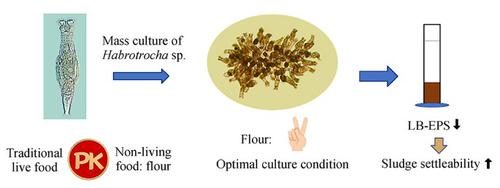Frontiers of Environmental Science & Engineering ( IF 6.4 ) Pub Date : 2021-07-23 , DOI: 10.1007/s11783-021-1477-4 Yun He 1 , Jianyong Liu 1 , Chengyuan Shen 1, 2 , Xuewen Yi 1, 3 , Xiaowei Li 1 , Xin Huang 1 , Guoji Ding 1 , Kokyo Oh 4

|
This study aims to establish a simple and efficient method for the mass culture of bdelloid rotifers, which is the basis for the application of bdelloid rotifers as biological manipulators to improve wastewater biological treatment performance. A common bdelloid rotifer, Habrotrocha sp., in a wastewater biological treatment system was selected as the culture target. Rotifers fed on flour could reproduce faster than those fed traditional food such as Chlorella vulgaris or mixed bacteria. As a rotifer food, flour has the advantages of simple preparation, effortless preservation, and low cost compared to live Chlorella vulgaris or mixed bacteria, so it is more suitable for the mass culture of rotifers. The optimal rotifer culture conditions using flour as food were also studied. According to the experimental results, the recommended rotifer culture conditions are a flour particle size of 1 µm, a flour concentration of 6 × 106 cell/mL, a temperature of 28°C, a pH level of 6.5 and salinity of 100–500 mg/L. In addition, the sludge volume index in the sequencing batch reactor (SBR) with the addition of cultured rotifers was 59.9 mL/g at the end of operation and decreased by 18.2% compared to SBR without rotifer, which indicates that the cultured rotifers still retained the function of helping to improve sludge settling. This function may be related to the rotifer’s role in inhibiting bacteria from producing loosely bound extracellular polymeric substances in the SBR.
中文翻译:

一种用于废水生物处理应用的蝶形轮虫培养创新方法
本研究旨在建立一种简单高效的蝶形轮虫大规模培养方法,为应用蝶形轮虫作为生物操纵器提高废水生物处理性能奠定基础。选择废水生物处理系统中的一种常见的蝶形轮虫Habrotrocha sp. 作为培养目标。以面粉为食的轮虫比以小球藻或混合细菌等传统食物为食的轮虫繁殖得更快。面粉作为轮虫食品,与活的普通小球藻相比,具有制备简单、保存方便、成本低等优点。或混合菌,更适合轮虫的批量培养。还研究了以面粉为食的最佳轮虫培养条件。根据实验结果,推荐的轮虫培养条件为面粉粒径为1 µm,面粉浓度为6 × 10 6cell/mL,温度为 28°C,pH 值为 6.5,盐度为 100–500 mg/L。此外,加入培养轮虫的序批式反应器(SBR)在运行结束时污泥体积指数为59.9 mL/g,比不加轮虫的SBR下降了18.2%,说明培养的轮虫仍然保留帮助改善污泥沉降的功能。这种功能可能与轮虫在抑制细菌在 SBR 中产生松散结合的胞外聚合物中的作用有关。



























 京公网安备 11010802027423号
京公网安备 11010802027423号